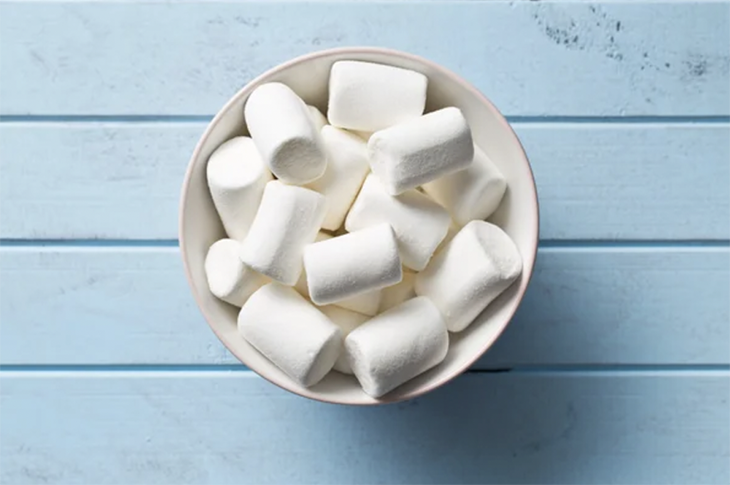
If you’re struggling with a nighttime cough, you might be enticed to experiment with the latest TikTok trend: consuming a marshmallow before bedtime.
TikTok users claim that marshmallows, containing gelatin, can effectively coat the throat and alleviate coughing, facilitating a restful night of sleep. It was in a viral TikTok post from December 30, which amassed a whopping 2.6 million views, that showcased one user advocating from the #marshmallow #homeremedy, which supposedly was recommended by her doctor to combat a severe and persistent cough that was disrupting her breathing and sleeping patterns at night.
According to the user, the doctor’s advice was quite straightforward: “Eat a jumbo marshmallow before bed.” Despite acknowledging the lack of scientific evidence behind the remedy, the doctor reportedly emphasized its efficacy, stating, “It sounds insane. There’s no science behind it. But it’s what I do. The gelatin helps coat your throat even better than honey.”
So, What’s in a Marshmallow?
However, a critical issue with this recommendation lies in the confusion between natural marshmallow root – an herbal remedy known for its throat-soothing properties – and commercially manufactured marshmallow, primarily composed of sugars and gelatin. Omid Mehdizadeh, MD, a specialist in voice and swallowing at Pacific Neuroscience Institute and Saint John’s Health Center in Santa Monica, California, highlights this discrepancy, urging caution in interpreting the efficacy of marshmallows for alleviating cough symptoms.
“Natural marshmallow root helps develop a protective coat along the lining of the throat, esophagus, and lungs, which can be soothing and act as an anti-inflammatory. This may in turn soothe irritation from any number of causes which could cause a cough,” Dr. Mehdizadeh says.
In addition, Dr. Mehdizadeh shares that most marshmallows sold commercially do not contain marshmallow root, while there is also no evidence that the gelatin in marshmallows actually works as a cough suppressant either.
Marshmallows: Why They Aren’t a Great Idea
While the idea of using marshmallows as a remedy for coughs may seem appealing, particularly for those who have exhausted other options or simply have a sweet tooth, Cynthia Li, MD, a specialist in internal and integrative medicine and author of Brave New Medicine, warns that it could potentially exacerbate symptoms.
Dr. Li says, “People might get excited by the permission — or overt prescription — to eat marshmallow candies. But sugar and corn syrup are the primary ingredients, and they are well known to cause inflammation and suppress the immune system.”
Which Home Cough Remedies Do Doctors Actually Recommend?
On the other hand, doctors often recommend simple remedies such as warm beverages to alleviate coughs. These beverages don’t need to be fancy or contain numerous ingredients.
As per Jeffrey Linder, MD, MPH, chief of general internal medicine and a professor at the Northwestern University Feinberg School of Medicine in Chicago, “Warm water with honey can soothe a sore throat and may make a cough feel better.”
Dr. Li add that bone broth is another great option. “Bone broth, which is gaining popularity for its healing properties, contains cysteine, glutamine, and carnosine — all compounds that have immune-supporting and mucus-thinning properties,” Li says.
Ways and Tips to Sleep Better When Dealing with a Cough
Dr. Li suggests practical measures to improve sleep quality when dealing with a cough, including adjusting bedroom conditions to mitigate nighttime coughing episodes.
Dr. Li adds, “Elevate the head of the bed to enhance the drainage of phlegm.”
For best results, it’s also recommended to sleep with both your head and chest elevated. To achieve this, use a specialized wedge pillow or stack some regular pillows on top of each other. Dr. Li also recommends putting books beneath your mattress to elevate the head of the bed.
Moreover, Dr. Li says that using a humidifier is another great sleep aid. “A humidifier can help if there is a lot of dryness, especially for someone who has to breathe through their mouth.”
Dr. Mehdizadeh also suggests to avoid eating meals late at night to lessen the likelihood of nighttime coughs since eating close to bedtime may also trigger acid reflux, which is a common cause of nighttime coughs. In addition, he also suggests using salt water solutions, such as nasal sprays or neti pots, to lessen sinus-related issues that contribute to coughing too, like postnasal drip.
Which Over-the-Counter Medicines Help With a Cough
If your cough refuses to let you sleep, then it’s worth heading over to the drugstore to pick up some items that an help. Dr. Li shares that cough drops can help, however you need to check the label to see which ones you should avoid due to a high sugar content.
“A cough drop that is low in sugar and artificial colors, with manuka honey or menthol would be a great choice,” Dr. Li says.
Dr. Mehdizadeh shares that other over-the-counter (OTC) cough syrups may help as well, especially those that have dextromethorphan, an active ingredient found in Robitussin. He also suggests using nasal anti-inflammatory sprays, such as Flonase or Nasacort, or eother allergy meds, which can also help reduce coughing at times.
However, Dr. Medhizadeh says that if your cough won’t quit, you should really see a doctor to figure out what’s causing it and how to make it better. “Follow up with a doctor for a cough that lasts more than two weeks, or for other symptoms including shortness of breath and chest discomfort,” Dr. Mehdizadeh says.
Meanwhile, Dr. Linder says that no matter what you try, one thing you shouldn’t do is rely on marshmallows to make a difference.
“There’s no high-quality evidence I’m aware of supporting the use of marshmallows for cough,” says Dr. Linder.



